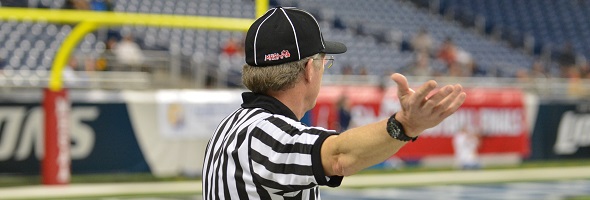
Be the Referee: Officials Demographics
October 29, 2015
This week, MHSAA assistant director Mark Uyl discusses the importance of recruiting young officials so they may gain experience now and prepare to replace veterans wearing the whistle.
Be The Referee is a series of short messages designed to help educate people on the rules of different sports, to help them better understand the art of officiating, and to recruit officials.
Below is this week's segment - Officials Demographics - Listen
A daily activity of the MHSAA is to recruit more officials in all of our sports. There is an urgency to try and bring new, younger people into the game as the current average age of an MHSAA registered official is 51.86.
Young officials are needed now so they can gain experience and be ready to step into the varsity and tournament ranks when many of our aging officials are ready to hang up the whistle. With players getting bigger and faster all of the time, it is important that our officials keep up with the pace of play, and the more younger, athletic officials we can recruit, the better off all of our games will be.
Past editions:
Oct. 15: Make the Call: Intentional Grounding - Listen
Oct. 8: Playoff Selection - Listen
Oct. 1: Kick Returns - Listen
Sept. 24: Concussions - Listen
Sept. 17: Automatic First Downs - Listen
Sept. 10: Correcting a Down - Listen
Sept 3: Spearing - Listen
Aug. 27: Missed Field Goal - Listen

Be the Referee: 40-Second Play Clock
August 30, 2018
In this week's edition, assistant director Brent Rice explains how Michigan is continuing to experiment with a 40-second play clock in football.
Be The Referee is a series of short messages designed to help educate people on the rules of different sports, to help them better understand the art of officiating, and to recruit officials.
Below is this week's segment – 40-Second Play Clock - Listen
There’s an experiment taking place on a number of high school football fields across the state again this year. Michigan is experimenting with a 40-second play clock in football.
This is designed to provide more consistency from play to play as the ball must be snapped 40 seconds after the end of the previous play and is not dependent on the referee’s subjective signal.
When play is continuing without a stoppage, the 40-second play clock will be used. If play has been stopped for a time out or penalty, the play clock will be set at 25 seconds.
After two seasons, the feedback received from coaches and officials has been very positive, and there’s a possibility the Michigan experiment may become a new national playing rule soon.
Past editions
August 23: Football Rules Changes - Listen

